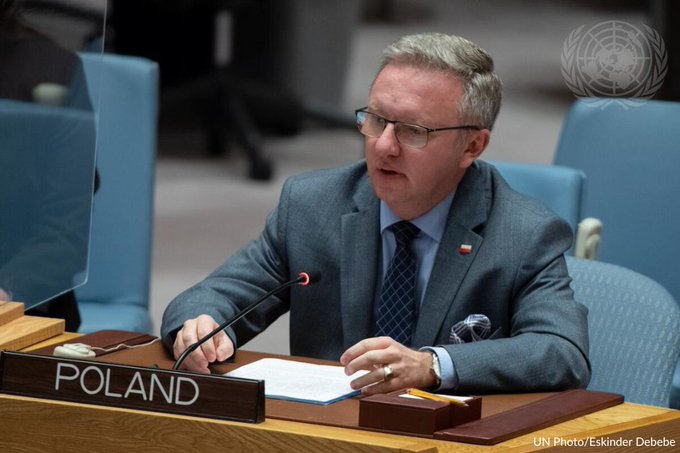WIADOMOŚCI
Polska w Radzie Bezpieczeństwa ONZ nt. bezpieczeństwa Zaporoskiej Elektrowni Jądrowej
Szef Międzynarodowej Agencji Energii Atomowej, Rafael Grossi wziął dziś, 30 maja br. udział w spotkaniu Rady Bezpieczeństwa ONZ dotyczącym bezpieczeństwa Zaporoskiej Elektrowni Jądrowej. Ambasador Krzysztof Szczerski przekazał pisemne stanowisko Polski, które zamieszczamy poniżej.
Pełny tytuł spotkania: UN Security Council Briefing on the situation in Ukraine: safety of the Zaporizhzhia Nuclear Power Plant. Spotkaniu przewodniczy Ignazio Cassis – Minister Spraw Zagranicznych Szwajcarii, która w maju sprawuje prezydencję w Radzie.
***
Poland fully supports the efforts undertaken by the International Atomic Agency, its Director-General Mr. Rafael Grossi and his staff. In our view, today’s UN Security Council meeting is very timely as it should provide a clear guidance for the Agency’s further endeavors related to nuclear safety and security in Ukraine.
There are several aspects of the threats stemming from Moscow’s aggression against Ukraine that should be taken into account in the light of today’s briefing. They all sum up in worrying developments in the deterioration of nuclear security and safety of Central and Eastern Europe. This includes both: the nuclear weapons field and the field of peaceful uses of nuclear energy.
Firstly, the war started by Russia, a permanent member of the UN Security Council and a nuclear-weapon State Party to the Non-Proliferation Treaty (NPT), constitutes a brutal violation of the existing international order and its fundamental principles and consequentially leads to the dismantling of the global non-proliferation and disarmament architecture. The invasion on Ukraine, in the first place, is a blatant violation of the Budapest Memorandum that provided Ukraine with security guarantees in exchange for its commitment to eliminate nuclear weapons from its territory. With regard to other obligations, it was Russia which suspended the implementation of the New START Treaty. It was Russia, again, which blocked the consensus during the 10th NPT Review Conference in 2022.
Secondly, the ongoing, appalling nuclear rhetoric of Russian politicians, military officials and the Russian media making threats of using nuclear weapons cannot be accepted by the international community, which should continue to pressure Moscow to abandon this irresponsible discourse.
Thirdly, the ongoing preparations to deploy Russian tactical nuclear weapons in Belarus are a somber manifestation of Moscow’s true intentions – a further escalation of tensions in Europe.
Fourthly, the ongoing mistreatment of the Ukrainian civil nuclear power installations and reckless de facto weaponization of these facilities constitute a serious challenge to the nuclear safety and security, not only of Ukraine, but also its neighbors in the region and the entire world.
37 years have passed since the tragic Chernobyl disaster, but for Poland, Ukraine’s closest neighbor, the memories of this devastating event are still fresh. We learned first-hand what harmful effects for health and natural environment such catastrophes have, and, relying on this experience, we need to stress – we all must do everything in our power to prevent such an event from ever happening again.
Russian actions in and around Ukrainian nuclear facilities, in particular the illegal annexation of Zaporizhzhia Nuclear Power Plant (ZNPP), are totally unacceptable. Poland is gravely concerned that the seven pillars of nuclear safety and security, presented by Director-General Grossi last year, are being continuously violated. We share the concern that the Ukrainian staff working at the plant is under unacceptable pressure.
The resolutions of the IAEA Board of Governors adopted so far – some of them initiated, and others supported by Poland – are very important in this context. They provide clear guidance for the Agency on how to comprehensively address the nuclear safety, security and safeguards implications of the current situation in Ukraine, including through continued presence and provision of necessary assistance. We call on Russia to implement the resolutions of the Board of Governors in a full and effective manner.
We commend the Agency’s missions on the ground in Ukraine – their continued presence in the Zaporizhzhia Nuclear Power Plant and in all other key Ukrainian nuclear facilities. We strongly support Director General’s efforts to ensure a regular rotation of IAEA experts and the establishment of the rules of nuclear safety and security around the Plant, in full respect for Ukraine’s sovereignty as well as in compliance with international law and order.
Therefore, we continue to call on Russia to withdraw its military equipment and all personnel, including that of ROSATOM, from the ZNPP, and to return its full control to its rightful owner, which is Ukraine.
It is highly deplorable that Russia continuously fails to show respect for the IAEA Board of Governors, the Agency and its Statute, and puts itself outside of the group of responsible nuclear states. Developments regarding nuclear safety and security in Ukraine are yet another reminder that Russia needs to finally get rid of its Soviet mind-set, which it is clinging to by using force and destruction in Ukraine.
The issue of nuclear safety and security in Ukraine should be treated with utmost seriousness and with a sense of urgency, bearing in mind that the consequences of a nuclear catastrophe are never local or regional and would continue to negatively influence the lives of many generations to come.

